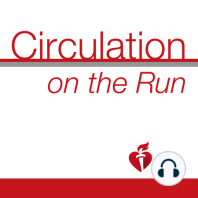16 min listen
Circulation December 21, 2021 Issue
ratings:
Length:
22 minutes
Released:
Dec 20, 2021
Format:
Podcast episode
Description
Please join Guest Host and Associate Editor Mercedes Carnethon and author Christine Albert as they discuss the article "Effect of Long-Term Marine ω-3 Fatty Acids Supplementation on the Risk of Atrial Fibrillation in Randomized Controlled Trials of Cardiovascular Outcomes: A Systematic Review and Meta-Analysis." Dr. Carolyn Lam: Welcome to Circulation on the Run, your weekly podcast summary and backstage pass to The Journal and its editors. We are your co-hosts, I'm Dr. Carolyn Lam, Associate Editor from the National Heart Center and Duke National University of Singapore. Dr. Greg Hundley: And I'm Dr. Greg Hundley, Associate Editor, Director of the Pauley Heart Center, VCU Health in Richmond, Virginia. Dr. Carolyn Lam: Greg, today's feature paper is such an important question clinically. It's something I've asked myself and so I cannot wait to discuss it in greater detail. It refers to the effect of long-term marine omega-3 fatty acid supplementation, and the risk of atrial fibrillation in randomized controlled trials of cardiovascular outcomes. So it talks about a systematic review and meta-analysis published in this week's issue. Dr. Carolyn Lam: All right. Okay. You got to wait in suspense, as do I, and let's discuss other papers, very important papers in today's issue too. I'd like to start with a bit of a quiz. So Greg, for converting atrial fibrillation, is the anterior-lateral or anterior posterior electrode position better? What's your guess? Dr. Greg Hundley: Oh, wow, Carolyn. That's interesting. We put these pads on and we kind of just follow the directions on whatever the particular device says. Interesting question. It's a guess, Carolyn, it's a guess. Antro-lateral? Dr. Carolyn Lam: Smarty pants. Well, let's see. Frankly I didn't know the answer. It's just such an elegant question, isn't it? To answer in a study. And this is exactly what Professor Løfgren from Randers University Hospital and Denmark and colleagues did. They performed a multi-center investigator initiated open label trial, where they randomly assigned 468 patients with atrial fibrillation scheduled for elective cardioversion to anterior-lateral versus anterior-posterior electrode position. Dr. Carolyn Lam: The primary outcome was the proportion of patients in sinus rhythm after the first shock. And so drum roll. The primary outcome occurred in 54% assigned to an anterior-lateral electrode position. And in 33% assigned to an anterior-posterior electrode position, a significant risk difference of 22% in favor of the anterior-lateral electrode position. Dr. Carolyn Lam: Cheers, Greg. There were no significant differences between groups in any safety outcomes and the superiority of the anterior-lateral electrode position was statistically significant both after the initial low energy shock and after a final high energy shock. So this study really suggests a practice change in the standard approach to electrode positioning for cardioversion in favor of anterior-lateral electrode position. Dr. Greg Hundley: Very nice, Carolyn. Very nice. Well, I'm going to come at you using your heart failure expertise and ask you a quiz here in just a second. But first I want to introduce this paper from Dr. Javier Barallobre-Barreiro from King's College London. Okay, Carolyn, here's your quiz. Do you think that the extracellular matrix fibrosis contributes to LV dysfunction in heart failure patients? Dr. Carolyn Lam: Absolutely. Dr. Greg Hundley: Very nice. I think, of course, you are correct. So Carolyn, remodeling of the extracellular matrix is a hallmark of heart failure and this team's previous analysis of the secretome of mirroring cardiac fibroblast returned ADAMTS5, a disintegrin and metalloproteinase with thrombospondin motifs 5 as one of the most abundant proteases. So ADAMTS5 cleaves chondroitin sulfate proteoglycans such as Versican. The contribution of ADAMTS5 and its substrate Versican to heart failure is unknown. Dr. Carolyn Lam: Ah, so what did the autho
Released:
Dec 20, 2021
Format:
Podcast episode
Titles in the series (100)
Circulation June 6, 2017 Issue: Circulation Weekly: Your Weekly Summary & Backstage Pass To The Journal by Circulation on the Run
